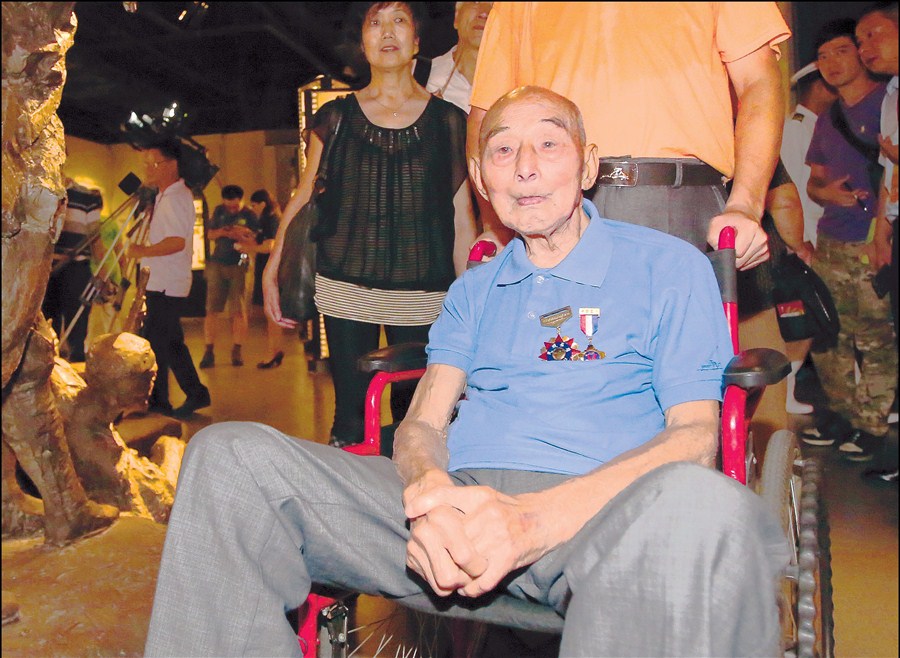103-year-old Liu Sengyao
 0 Comment(s)
0 Comment(s) Print
Print E-mail Shanghai Daily, August 14, 2015
E-mail Shanghai Daily, August 14, 2015
Although 103 years old and confined to a wheelchair, Liu Sengyao was transported back almost 80 years yesterday as he demonstrated the oath he took to general Zhang Zhizhong before leading his company as acting captain into action against the Japanese army in Yuepu Town in Baoshan District, during the second Battle of Songhu in 1937.
 |
|
Liu Sengyao, 103 |
Making a fist with a trembling hand, Liu recited in a weak voice, "My body exists together with the Chinese territory."
Liu certainly kept his oath, pledging to defend his country with his life, for he was almost killed three times by the Japanese in a battle that formed a crucial charter in China's War of Resistance Against Japanese Aggression (1937-45).
Yesterday, Liu remembered these days when he visited the Shanghai Songhu Anti-Japanese Battle Memorial Hall in Baoshan for its reopening.
Although now frail, Liu, who joined the army at 16, recalled how during the battle he ran out of ammunition. Undaunted, he put into practice kungfu training he learned at the Shaolin Temple in central China's Henan province, using a sword to defend himself.
Liu has permanent reminders of his bravery in the form of four large scars left by Japanese bayonets on his legs and arms. His exploits are also recorded in the medals proudly pinned to his chest.
Liu was one of three Battle of Songhu veterans visiting the memorial hall yesterday to see its many new exhibits to mark the 70th anniversary of the surrender of Japan and the end of World War II on August 15, 1945.
The 94-year-old Zeng Xiangao, former leader of a special mission squad, was impressed by a film in the hall about a fierce skirmish.
"It was so real that it reminds me of many details of the battle," Zeng said.
His proudest moment was leading a 13-strong team to attack Japanese troops at an airfield on Chongming Island.
Zeng said he was thrilled to see the old weapons he once used being exhibited in the hall. "The weapons used by the Chinese army have of course improved greatly since our times," he said.
A native of Anhui Province who joined the army when he was 16, Zeng still remembers the name of his regimental and battalion commanders, as well as comrades in his squad who were killed in the 13 missions he led.
He can also still sing a song from those days, with a line about "chopping the enemy's head with a sword." Zeng said he did use a sword in combat during secret night missions.
He also revealed that his wife and son were killed in Japanese air raids.
The sole survival of the No.128 Army, 90-year-old Xie Tianyou said he could feel the pain caused by three shell fragments still in his body as he looked at exhibits of the battle he fought in.
Xie gave a salute to the hall from his wheelchair afterward.
"I was shocked at how the Chinese army's weapons exhibited lagged behind those of the Japanese," Xie said.
He joined the army when was only 12 years old, after his home in neighboring Zhejiang Province was destroyed by Japanese troops, and served as a signaler.
Xie was described as an outstanding signaler in the battle, said to be because he was too young to catch the attention of the Japanese.
The second Battle of Songhu, started on August 13, 1937, and lasted for more than three months. Over 300,000 Chinese soldiers were killed while Japan reported 40,000 casualties.
It ended on November 12, 1937, when Chinese troops had to retreat after Japanese reinforcements landed.






Go to Forum >>0 Comment(s)